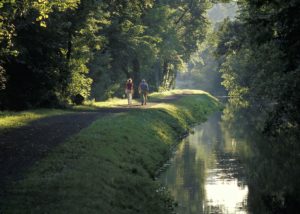Rep. Alex Charlton (R-Delaware), accompanied by a bipartisan group of fellow legislators, called on House Environmental Resources and Energy Chairman John Maher (R-Allegheny) to schedule a vote on legislation that would reinvigorate Pennsylvania’s Growing Greener program at a Capitol press conference earlier today.
“This legislation, if coupled with new state funding commitments for Growing Greener, would deliver real, tangible, and lasting benefits to all Pennsylvanians,” said Charlton. “It would empower our communities to address critical environmental priorities such as conserving land, protecting water resources, restoring damaged waterways and providing for healthier, prosperous and sustainable communities.”
The framework for Growing Greener III exists in two pieces of legislation, Senate Bill 799, which passed the Senate by a 47-2 vote in January and House Bill 2485.
Larry Williamson of the Growing Greener Coalition who joined the legislators today, said, “The Growing Greener Coalition has been working for close to a decade on a fully-funded Growing Greener III program. I guess patience is a virtue. We believe that a $50 million down payment will provide immediate support to green infrastructure.”
“Growing Greener is one of the greatest success stories to come out of the General Assembly,” stated Senator Tom McGarrigle (R-Delaware and Chester). “It marked an unprecedented, bipartisan commitment to funding vital environmental protections in a fiscally responsible manner.”
“Growing Greener is a critically important program that has a successful track record of preserving Pennsylvania’s natural resources,” said Senator Tom Killion (R-Delaware and Chester). “Growing Greener III will continue to protect our land and waterways. This legislation is the first step in renewing our commitment to the environment and enhancing the quality of life for Pennsylvania’s families.”
“I echo the sentiments of my colleagues, Senators McGarrigle and Killion,” declared Senator Rich Alloway (R-Adams, Cumberland, Franklin and York), sponsor of Senate Bill 799. “It is long overdue to modernize Pennsylvania’s wildly successful Growing Greener program. SB 799 is a great first step to implementing a 21st century Growing Greener program as well as a public- private partnership to address PA’s growing responsibilities to the Chesapeake Bay.”
“The Growing Greener Program has a significant environmental and economic impact across Pennsylvania,” said Senator John Yudichak (D- Carbon and Luzerne) and the Minority Chair of the Senate Environmental Resources and Energy Committee. “The program has helped forge public-private partnerships between the Earth Conservancy and Northpoint Development leading to the reclamation of thousands of acres of abandon mine land and the creation of more than three thousand jobs in the South Valley corridor of Luzerne County.”
“Safeguarding our land, our water and natural resources is essential to maintaining a healthy, thriving economy,” noted Rep. Rob Matzie (D-Allegheny and Beaver). “Exciting, large scale manufacturing development is happening in Beaver County and southwest Pennsylvania as we speak. Reclaimed brownfields are a big part of the reason why.”
Noted Rep. Hal English (R-Allegheny), prime sponsor of House Bill 2485, “I look forward to funding Growing Greener III to renew our commitment to help us protect our wonderful and abundant natural resources today and for future generations.”
